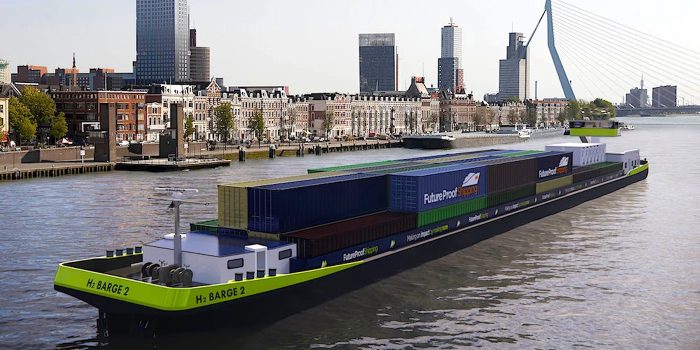The H2 Barge 2, a hydrogen fuel-cell powered ship developed by Dutch shipowner Future Proof Shipping (FPS), offers a groundbreaking solution for emissions-free container transport along the Rhine between Rotterdam and Duisburg.
Funded by the EU Flagships project and the Interreg ZEM Ports NS project, this vessel, formerly known as Fenny 1 and FPS Waal, was initially conventionally powered before being converted to electric drive. Its propulsion system consists of six PEM fuel cells, hydrogen storage, and several battery packs installed below deck, providing 1.2 MW of power to drive the vessel’s motors.

The conversion to hydrogen power is projected to slash 3,000 tons of CO2 emissions annually, making significant strides towards decarbonizing freight transport in Europe. Mirela Atanasiu, Executive Director ad interim of Clean Hydrogen Partnership, highlights the importance of inland waterways in European freight transport and praises the vessel’s contribution to zero-emission alternatives, combining batteries with green hydrogen fuel cells.
The successful retrofitting of the H2 Barge 2 sets a precedent for future conversions, demonstrating the feasibility of transitioning from diesel combustion to zero-emission technologies.
The H2 Barge 2 is part of the EU Flagships project, with another demonstrator vessel, Zulu 06, scheduled for deployment in Paris. Hydrogen technology has been doubted for cars, but it’s gaining trust for big machines like ships because they need lots of power.

Even though hydrogen used to be too expensive, new technology and more worries about the environment are making it popular in ships. But better batteries are also getting in the way, so there’s a competition to see which one will be better for clean transport in the future.
In summary, the H2 Barge 2 represents a significant milestone in the transition to zero-emission shipping, showcasing the potential of hydrogen fuel cells in reducing carbon emissions and fostering innovation in the maritime sector. Despite challenges, such as cost and competition from battery technology, hydrogen propulsion offers a viable solution for decarbonizing heavy equipment and advancing sustainable freight transport in Europe and beyond.


